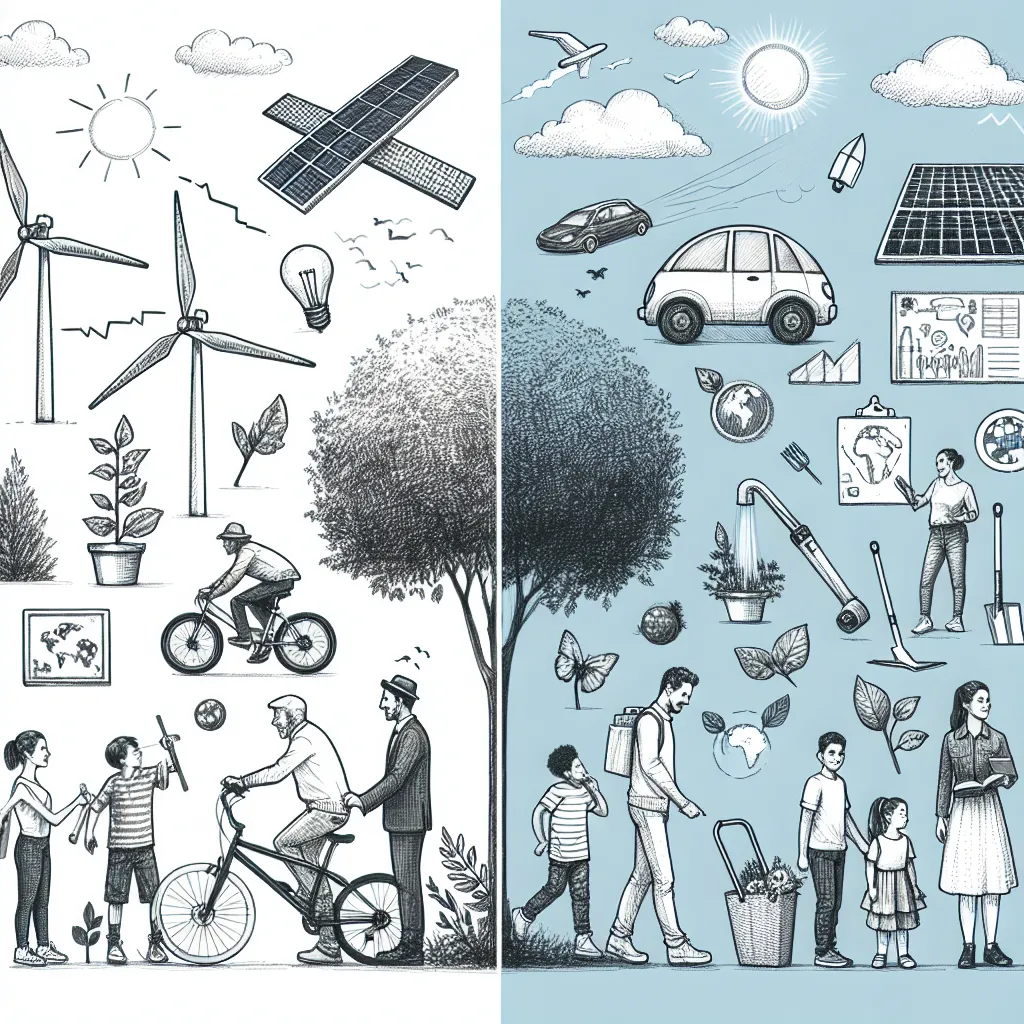Digital innovation and its impact on industries is a compelling topic that has gained significant attention in recent IELTS exams. As an experienced IELTS instructor, I’ve observed this theme appearing with increasing frequency, and I anticipate it will continue to be a popular subject in future tests. Let’s explore this topic through the lens of IELTS Writing Task 2, providing you with valuable insights and sample essays to enhance your writing skills.
Analyzing the Task and Choosing a Prompt
After reviewing recent IELTS exams, I’ve identified a relevant prompt that aligns closely with our theme:
Some people believe that technological innovation is the key to solving environmental problems, while others argue that changing human behavior is more important. Discuss both views and give your own opinion.
This prompt encapsulates the essence of how digital innovation drives industry change, particularly in the context of environmental challenges. Let’s break it down and craft compelling responses for different band scores.
Prompt Analysis
This question requires you to:
- Discuss the view that technological innovation can solve environmental problems
- Explore the opposing view that changing human behavior is more crucial
- Provide your own opinion on which approach is more effective
Remember to address all parts of the prompt and support your arguments with relevant examples.
 IELTS Writing Task 2 Environmental Technology
IELTS Writing Task 2 Environmental Technology
Sample Essay for Band 8-9
Technological advancements and human behavior modification are both touted as solutions to our pressing environmental challenges. While some argue that innovation is the key to addressing these issues, others contend that altering human conduct is more crucial. In my view, a combination of both approaches is necessary to effectively combat environmental problems.
Those who champion technological innovation argue that it can provide groundbreaking solutions to environmental issues. For instance, the development of renewable energy technologies like solar panels and wind turbines has significantly reduced our reliance on fossil fuels, thereby decreasing carbon emissions. Similarly, innovations in waste management, such as advanced recycling techniques and biodegradable materials, have the potential to drastically reduce pollution and landfill waste. These technological breakthroughs offer tangible and scalable solutions that can be implemented across industries and nations.
On the other hand, proponents of behavioral change argue that technology alone cannot solve our environmental problems without a shift in human attitudes and actions. They contend that even the most advanced eco-friendly technologies will have limited impact if people do not adopt sustainable practices in their daily lives. For example, electric vehicles can only reduce carbon emissions if people choose to use them over conventional cars. Moreover, reducing consumption, properly disposing of waste, and supporting sustainable products are all behavioral changes that can have a significant collective impact on the environment.
In my opinion, the most effective approach to solving environmental problems lies in combining technological innovation with behavioral change. While technology can provide us with the tools and infrastructure to live more sustainably, it is ultimately human behavior that determines the extent to which these innovations are utilized. For instance, smart home systems can optimize energy usage, but their effectiveness depends on people’s willingness to install and properly use them. Similarly, while plant-based meat alternatives offer a more sustainable protein source, their impact relies on consumers choosing them over traditional meat products.
In conclusion, both technological innovation and behavioral change play crucial roles in addressing environmental challenges. By leveraging the power of technology while simultaneously fostering a culture of environmental responsibility, we can create a more sustainable future. Governments, businesses, and individuals must work together to promote both innovative solutions and sustainable practices to effectively combat the environmental issues we face.
(Word count: 365)
Sample Essay for Band 6-7
In today’s world, environmental problems are a big concern. Some people think that new technology is the answer, while others believe changing how people act is more important. I will discuss both ideas and give my opinion.
First, many people say that technology can help solve environmental problems. For example, electric cars can reduce pollution from normal cars. Also, solar panels and wind turbines can give us clean energy instead of using coal or oil. These new inventions can help us protect the environment without changing our way of life too much.
However, other people think that changing human behavior is more important. They say that even if we have good technology, it won’t help if people don’t use it properly. For instance, recycling is only useful if people actually separate their trash correctly. Also, using less energy and water in our homes can make a big difference, but people need to remember to do it.
In my opinion, we need both technology and behavior change to solve environmental problems. New inventions can give us better ways to be eco-friendly, but we also need to change our habits to use these inventions properly. For example, having energy-efficient appliances is good, but we also need to remember to turn them off when not in use.
To conclude, I believe that both new technology and changes in human behavior are important for solving environmental issues. We should support the development of green technology while also teaching people how to live in a more environmentally friendly way. By doing both, we have a better chance of protecting our planet for the future.
(Word count: 268)
Key Writing Tips
-
Introduction: Clearly state the topic and your position. For higher bands, paraphrase the prompt creatively.
-
Paragraph Structure: Use PEEL (Point, Explanation, Example, Link) for body paragraphs. This is crucial for band 7 and above.
-
Cohesion: Use a variety of linking words appropriately. Band 8-9 essays should have sophisticated cohesive devices.
-
Vocabulary: For band 6-7, use topic-specific vocabulary correctly. For band 8-9, incorporate advanced vocabulary and idiomatic expressions naturally.
-
Grammar: Band 6-7 should have a mix of simple and complex sentences with few errors. Band 8-9 should demonstrate a wide range of structures with high accuracy.
-
Task Response: Fully address all parts of the prompt. Higher band scores require a nuanced approach to the topic.
-
Conclusion: Summarize your main points and restate your opinion. For band 8-9, add a final thought or implication.
Essential Vocabulary
- Technological innovation (noun) /ˌtek.nəˈlɒdʒ.ɪ.kəl ˌɪn.əˈveɪ.ʃən/ – The process of developing and introducing new technologies
- Environmental sustainability (noun) /ɪnˌvaɪ.rən.men.təl səˌsteɪ.nə.ˈbɪl.ə.ti/ – The practice of interacting with the environment without depleting natural resources
- Renewable energy (noun) /rɪˈnjuː.ə.bəl ˈen.ə.dʒi/ – Energy from sources that are naturally replenished
- Carbon emissions (noun) /ˈkɑː.bən iˈmɪʃ.ənz/ – The release of carbon dioxide into the atmosphere
- Behavioral change (noun) /bɪˈheɪ.vjər.əl tʃeɪndʒ/ – Alteration in human actions or conduct
- Eco-friendly (adjective) /ˈiː.kəʊ ˈfrend.li/ – Not harmful to the environment
- Sustainable practices (noun) /səˈsteɪ.nə.bəl ˈpræk.tɪ.sɪz/ – Methods of using resources that do not deplete them
- Green technology (noun) /ɡriːn tekˈnɒl.ə.dʒi/ – Technology that is environmentally friendly
Conclusion
The topic of digital innovation driving industry change, particularly in the context of environmental solutions, is likely to remain relevant in future IELTS exams. By understanding the key aspects of this theme and practicing with sample essays like those provided, you can improve your ability to tackle similar questions effectively.
To further enhance your skills, try writing your own essay based on the prompt we discussed. Consider how you would approach the topic differently for various band scores. Feel free to share your practice essays in the comments section for feedback and discussion. This active engagement will help you develop the critical thinking and writing skills necessary for success in IELTS Writing Task 2.
Remember, the key to mastering IELTS Writing is consistent practice and thoughtful reflection on your work. Good luck with your IELTS preparation!


